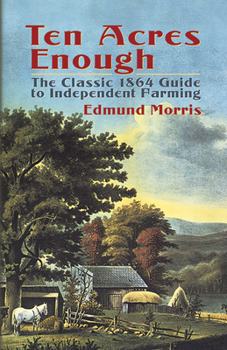Ten Acres Enough: The Classic 1864 Guide to Independent Farming
Select Format
Select Condition 
Book Overview
"Recently we have seen a great back-to-the-land movement, with many young professional people returning to small scale farming; thus it is great fun to read about someone who did exactly the same... This description may be from another edition of this product.
Format:Paperback
Language:English
ISBN:048643737X
ISBN13:9780486437378
Release Date:July 2004
Publisher:Dover Publications
Length:170 Pages
Weight:0.54 lbs.
Dimensions:0.4" x 5.4" x 8.5"
Customer Reviews
4 ratings
easily read
Published by Thriftbooks.com User , 15 years ago
good book - very interesting - some ideas are outdated but the story makes you want to cash in the retirement and buy a small place on 10 acres
Inspirational
Published by Thriftbooks.com User , 16 years ago
Ah, truly a book to inspire. I wanted to dash right out and dig up the old potato patch! Although this is an American book and therfore I did not understand a lot of the geographical references, this in no way detracted from the enjoyment I got from this book. I felt a bit smug when thinking about the success I have had with my chickens, but quite wilted when comparing his raspberries and strawberries with mine! Next season, I'm going to get me a lawtonberry or two. I found it a bit tedious towards the end but that was when he was no longer writing about his own little farm and I think many of his comments there are quite dated and of no practical value now. This book was well written and entertaining, though some comments I feel should rather be taken with a pinch of salt. Rather sorry that I have finished reading this book and heartily recommend it to anyone who has fancied getting a small-holding or even those who just want to grow something well in their own backyard. Many of his tips and comments are as valid today as they were 140 years ago.
Makes you want to get back to the basics
Published by Thriftbooks.com User , 17 years ago
Great read. I bought this book looking for some ideas on how to better enjoy the farm life I now have. This book tells about a man who is tried of the hustle and bustle of city life. (And mind you this was in the late 1800's). He writes in detail how to locate a small piece of property and live a much fulfilled life. I highly recommend this book. I have already loaned it out twice. P.S. see if you can find the small reference about The Civil War.
Most excellent!
Published by Thriftbooks.com User , 19 years ago
This is one of my favorites. Since it was written during the mid-1860's, the writing style is perhaps a bit different from what we are used to nowadays, but not distractingly so. This farmer knows how to tell a story. He starts with his longing to leave the city, leads us through his search for an affordable property and then lets us follow him as he chooses his crops -- among them, 804 peach trees at 7 cents a piece, all dutifully "tarred" to prevent worms -- and markets the produce for the first few years on the farm. Along the way, he scatters fascinating tidbits about his life. One of my favorites is the story of his blackberry plants. While living in town, he had read of a new kind of blackberry that intrigued him, and though it was a very unheard of thing to do at the time, he orderd six of the plants by mail, at the princely sum of five dollars. When the plants arrived, he was shocked at their size and appearance. "They looked like long white worms, with here and there a bud or an eye" and was too embarassed to admit to his wife that he paid so much for them. But he planted them and tended them, and the next year had a magnificent crop of berries, and so finally admitted to the cost. He and his wife agreed it was a bargain at that, and since they loved the berries so much, they dug up the plants and took them along to their new farm. There, the berries attracted the attention of neighbors and nurserymen, and by being one of the first suppliers in the area, he was able to sell $460 worth of blackberry plants that first year on the farm -- quite a return on his initial five dollar investment. There's more, and he catalogs it all: the cow that worked out well and the chickens that didn't, the way his neighbors thought him insane for battling the never-ending weeds, the value he saw in small birds, the money spent on load after load of manure, and mostly, the satisfaction of it all. There really is no substitute for farming done this way, where taking care of the land itself is still a priority, and the crops a source of pride. So if you are even the slightest bit interested in coming to the country in search of something better, I encourage you to read this book. Initially, I hesitated to buy it, figuring that it would be too irrelevant and dated, but no, it's not. It's absorbing. And though I can't find peach trees for 7 cents a piece today, the story is the same. And if you don't find yourself living in the country soon enough to suit you, you'll at least have had the pleasure of sharing Edmund Morris's farm for awhile.





